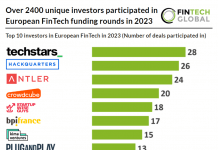The US is a huge market for FinTech, enough that seeking international expansion is not a necessity for major growth. However, international payment solutions and infrastructure provider Currencycloud argues that US FinTechs should start looking abroad.
The trend of FinTechs prioritising the home market is a fairly common one, particularly in the United States. With the largest economy globally, the US offers an unparalleled commercial playground for FinTechs, allowing them to serve hundreds of millions of customers without the need to navigate the complexities of international markets. This situation differs significantly from other FinTech hubs like London or Berlin, where businesses recognise the necessity of global expansion for sustained growth.
However, the appeal of the lucrative US market is not the sole reason for the limited global aspirations of FinTechs. There exists a perception within the US FinTech community that expanding internationally is a venture into uncharted territory. The perceived compliance and risk-management challenges associated with transborder operations often deter companies from exploring global opportunities.
The Shift Towards a Global Mindset
Recent research from Plaid indicates that nearly half of all Americans now use a FinTech for their daily financial management. This number is up from 42% in 2020, with 76% of the respondents indicating increased use of technology for financial management over the years.
However, as the venture capital frenzy begins to cool, investors are becoming more discerning about their investments. Influential venture capitalists are championing the ‘default global’ concept, a business model that encourages companies to plan for worldwide expansion from inception. As this idea gains traction, shrewd founders are taking note.
Two types of models tend to flourish in a global setting. The first is a business-to-business (B2B) model that caters to the end-user, such as a small business or consumer. Levro, a multi-currency business neobank, is an example of this model. The second type is companies that provide the underlying technological infrastructure, like Episode Six, which offers payment processing and ledger management infrastructure.
Why US FinTechs Should Think Globally
Currencycloud concluded that while the US remains a favourable environment for establishing a FinTech company, the reality is that investors are becoming increasingly selective, and they have a global pool to choose from. Amid increased scrutiny on start-ups’ revenue and financial stability, adopting a global mindset from the outset could be the critical difference that enables a founder or CEO to transition from pitching an idea to operating a successful business.
Read the full post here.
Keep up with all the latest FinTech news here.
Copyright © 2023 FinTech Global











